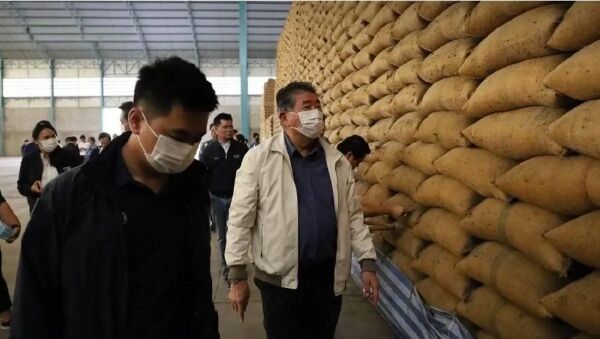Decade-old rice prompts questions about health risks

In an urgent call to the authorities, a rice specialist has sounded the alarm over the government’s plans to distribute a decade-old rice stockpile to the public, highlighting serious health risks.
This comes in the wake of Deputy Prime Minister and Commerce Minister Phumtham Wechayachai’s inspection of two Surin province warehouses on March 14, where he declared the 10 year old rice fit for consumption.
Stored under the remnants of the controversial rice-pledging scheme from the Yingluck Shinawatra era, a staggering 145,590 sacks of rice have been languishing in Poonpol Trading Co Ltd’s and Kittichai’s warehouses. Amidst rising storage costs, Phumtham aims to auction the rice, potentially raising between 300 million to 500 million baht. Despite his assurances of the rice’s quality, citing its enduring jasmine fragrance and satisfactory taste when cooked, concerns escalate.
Associate Professor Dr Somporn Isvilanonda, a senior fellow at the Knowledge Network Institute of Thailand, contests Phumtham’s optimistic assessment. He argues that jasmine rice’s shelf life typically spans three to four years, extendable to five under optimal storage conditions, reported The Nation.
The primary worry is the potential development of aflatoxins, hazardous compounds produced by fungi, a risk exacerbated by the rice’s prolonged exposure to anti-moth chemicals.
ORIGINAL STORY: Decade-old Thai rice from controversial scheme found fresh
Deputy Prime Minister and Commerce Minister Phumtham Wechayachai conducted a rice inspection following an invitation from the Association of Thai Agricultural Product Surveyors.
The association, keen to dispel allegations regarding the quality of rice held under the contentious rice-pledging scheme, orchestrated an eventful visit to warehouses owned by Poonpon Trading Ltd and Kittichai Ltd in different districts of the northeastern province.
Accompanied by three key stakeholders, warehouse owners, provincial commerce officials, and representatives from the Public Warehouse Organisation, Phumtham meticulously inspected the rice stocks. In a twist that surprised many, the verdict emerged: the rice, despite its age, retained its quality.
“We need to release this rice to the market as soon as possible.”
Phumtham highlighted the opportune moment given the current decent rice prices. This decision, he claimed, would not only secure government profits but also alleviate various stakeholders’ concerns.
The rice-pledging scheme, initiated by former Prime Minister Yingluck Shinawatra post the 2011 election, aimed to empower Thai farmers by offering higher prices for their crops. However, the scheme was marred by controversy, with accusations of significant financial losses and substandard storage practices rampant, reported The Nation.
According to the Association of Thai Agricultural Product Surveyors, Poonpon Trading’s warehouse harbours 32,879 bags of rice, while the Kittichai facility accommodates a whopping 112,711 bags, each bag weighing 50 kilogrammes.
Latest Thailand News
Follow The Thaiger on Google News:


























